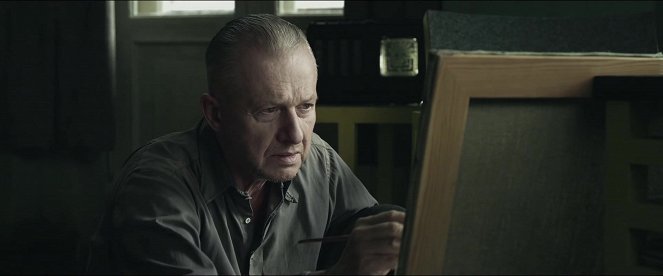Directed by:
Andrzej WajdaScreenplay:
Andrzej MularczykCinematography:
Pawel EdelmanCast:
Boguslaw Linda, Aleksandra Justa, Zofia Wichlacz, Krzysztof Pieczynski, Szymon Bobrowski, Mariusz Bonaszewski, Maria Semotiuk, Bronislawa Zamachowska (more)Plots(1)
Strzeminski was a compelling and charismatic artist and teacher. Wajda picks up his story in postwar Lodz, where he teaches at the Higher School of Plastic Arts. His ideas, set out in a revolutionary book he has written about art, run headlong into Stalin's dictates on what is good for the masses: social realism and superficial positivism. This is the dynamic that feeds Afterimage's utterly compelling narrative about a highly principled individual who confronts the indifference and, soon enough, anger of the authorities determined to stamp out anyone who questions the party line. A double amputee, Strzeminski is a restless force of nature idolized by the younger generation and the students he teaches. (Toronto International Film Festival)
(more)Reviews (2)
Hat's off to his! Afterimage is more than just a dignified farewell to the incredibly long, prolific, and successful creative career of the most significant Polish filmmaker Andrzej Wajda. The majority of his colleagues are unable to come close to what he managed to shoot at the age of 90 throughout their entire body of work. His last film belongs to the best he has ever made, even though it is apparent that at this age he no longer experimented and conservatively relied on what he knew. However, each shot reveals a filmmaker with a clear idea of what he wants and how to achieve it, capable of working with the language of film and, above all, capable of telling a story and conveying information about his characters through images. Wajda chose a subject that allowed him to present a strong, extraordinary personality of Polish history and at the same time confront, through this subject, the fact that he himself had dealt with the regime a bit in his youth. Unlike his protagonist, he did not confront the system, even though from the beginning he surpassed the local conditions and time. Wajda's portrayal of the 1940s and 1950s, when Stalinism gained maximum influence in Central Europe, is suggestive, perhaps also because he personally experienced that era. Poland from that time is portrayed by Wajda as inhospitable, full of oppressive atmosphere, with no place for optimism, only occasionally surviving defiance and islands of human solidarity. A separate chapter is the performance of Boguslaw Linda in the lead role. He delivered such a fantastic performance that you really feel like he actually had his limbs amputated for the sake of the role. I give it a solid 4 stars, knowing that I will still think a lot about whether to give Wajda the fifth star for his lifelong merits. He deserves it. Overall impression: 85%.
()
This biographical movie about the avant-garde Polish painter Wladyslaw Strzeminski only reinforced my belief in the importance of the Communists being removed from power in the Eastern Bloc countries more than thirty years ago. However, their domination still managed to cause devastating damage. The total destruction of the individual and his personality, and consequently of society as a whole, which Andrzej Wajda's movie highlights, is truly chilling. (75%)
()

